The Impact of Values on Individual and Organizational Behavior
VerifiedAdded on 2022/09/22
|9
|2283
|33
Essay
AI Summary
This essay delves into the significant influence of values on both individual and organizational behavior. It begins by defining values and exploring their diverse types, such as cultural, organizational, and personal values, highlighting their role in guiding employee actions. The essay analyzes how values affect individual emotions, behaviors, and organizational culture, emphasizing the impact of ethical values on organizational functions. It also examines the differences in values across generations and how these differences affect behavior in the workplace. Furthermore, the essay discusses how organizations can use values to direct behaviors, illustrating examples like Amazon, which aligns individual values with organizational goals. The second part of the essay provides a reflective piece where the student discusses their core values and how these values influence their leadership style and behavior. The student also reflects on how value conflicts can create disparities in the working relationship and how understanding others' values can improve relationships at work.
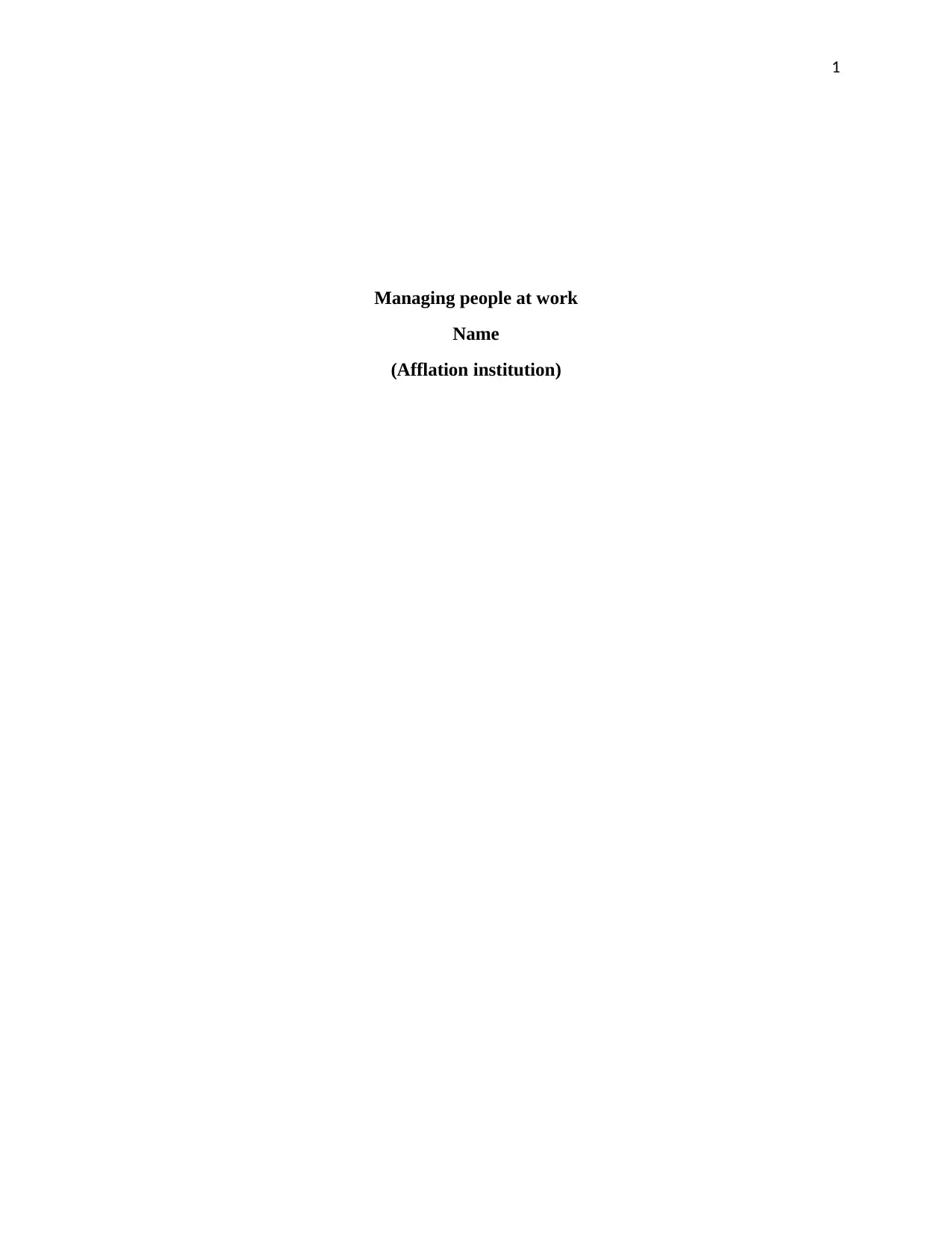
1
Managing people at work
Name
(Afflation institution)
Managing people at work
Name
(Afflation institution)
Paraphrase This Document
Need a fresh take? Get an instant paraphrase of this document with our AI Paraphraser
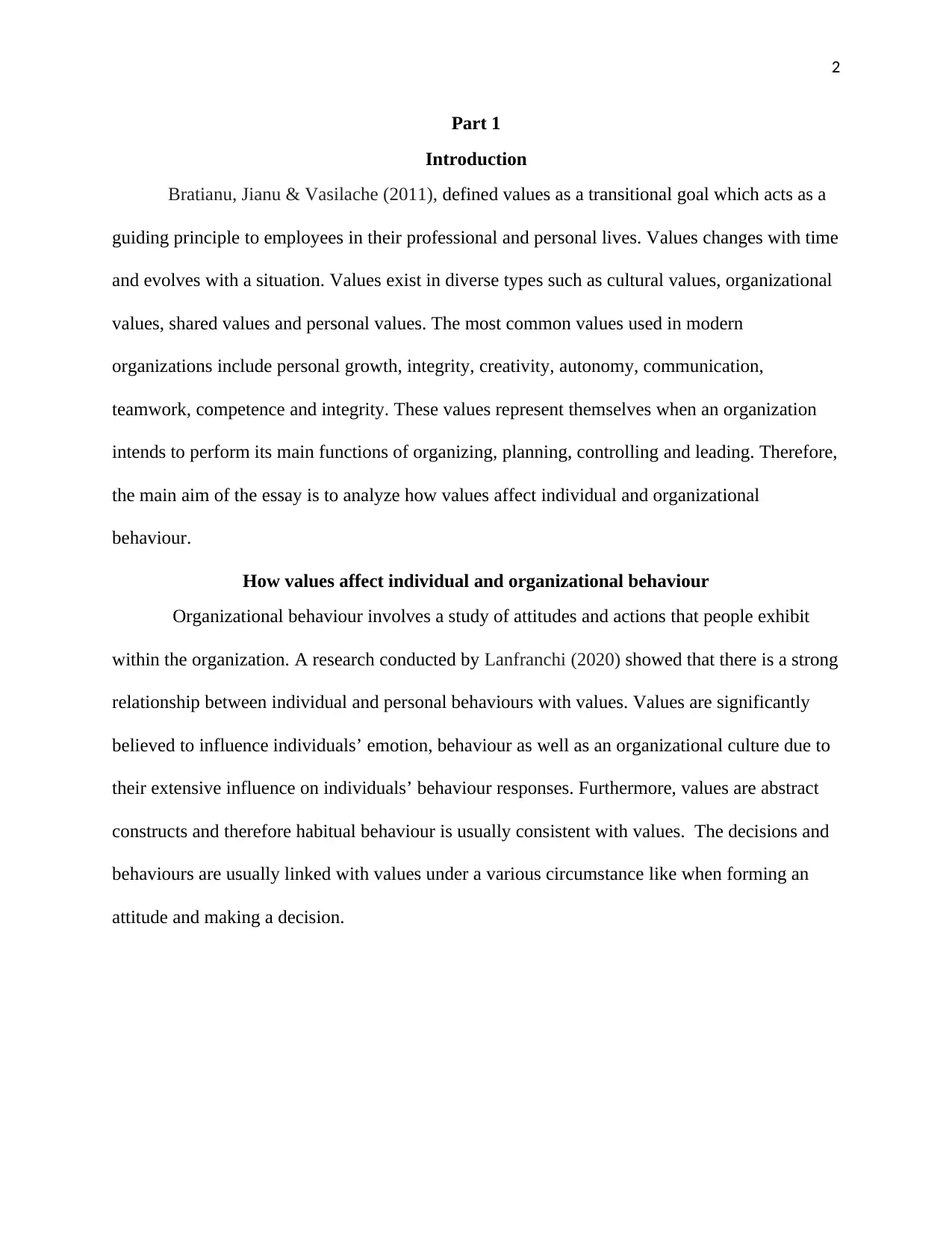
2
Part 1
Introduction
Bratianu, Jianu & Vasilache (2011), defined values as a transitional goal which acts as a
guiding principle to employees in their professional and personal lives. Values changes with time
and evolves with a situation. Values exist in diverse types such as cultural values, organizational
values, shared values and personal values. The most common values used in modern
organizations include personal growth, integrity, creativity, autonomy, communication,
teamwork, competence and integrity. These values represent themselves when an organization
intends to perform its main functions of organizing, planning, controlling and leading. Therefore,
the main aim of the essay is to analyze how values affect individual and organizational
behaviour.
How values affect individual and organizational behaviour
Organizational behaviour involves a study of attitudes and actions that people exhibit
within the organization. A research conducted by Lanfranchi (2020) showed that there is a strong
relationship between individual and personal behaviours with values. Values are significantly
believed to influence individuals’ emotion, behaviour as well as an organizational culture due to
their extensive influence on individuals’ behaviour responses. Furthermore, values are abstract
constructs and therefore habitual behaviour is usually consistent with values. The decisions and
behaviours are usually linked with values under a various circumstance like when forming an
attitude and making a decision.
Part 1
Introduction
Bratianu, Jianu & Vasilache (2011), defined values as a transitional goal which acts as a
guiding principle to employees in their professional and personal lives. Values changes with time
and evolves with a situation. Values exist in diverse types such as cultural values, organizational
values, shared values and personal values. The most common values used in modern
organizations include personal growth, integrity, creativity, autonomy, communication,
teamwork, competence and integrity. These values represent themselves when an organization
intends to perform its main functions of organizing, planning, controlling and leading. Therefore,
the main aim of the essay is to analyze how values affect individual and organizational
behaviour.
How values affect individual and organizational behaviour
Organizational behaviour involves a study of attitudes and actions that people exhibit
within the organization. A research conducted by Lanfranchi (2020) showed that there is a strong
relationship between individual and personal behaviours with values. Values are significantly
believed to influence individuals’ emotion, behaviour as well as an organizational culture due to
their extensive influence on individuals’ behaviour responses. Furthermore, values are abstract
constructs and therefore habitual behaviour is usually consistent with values. The decisions and
behaviours are usually linked with values under a various circumstance like when forming an
attitude and making a decision.
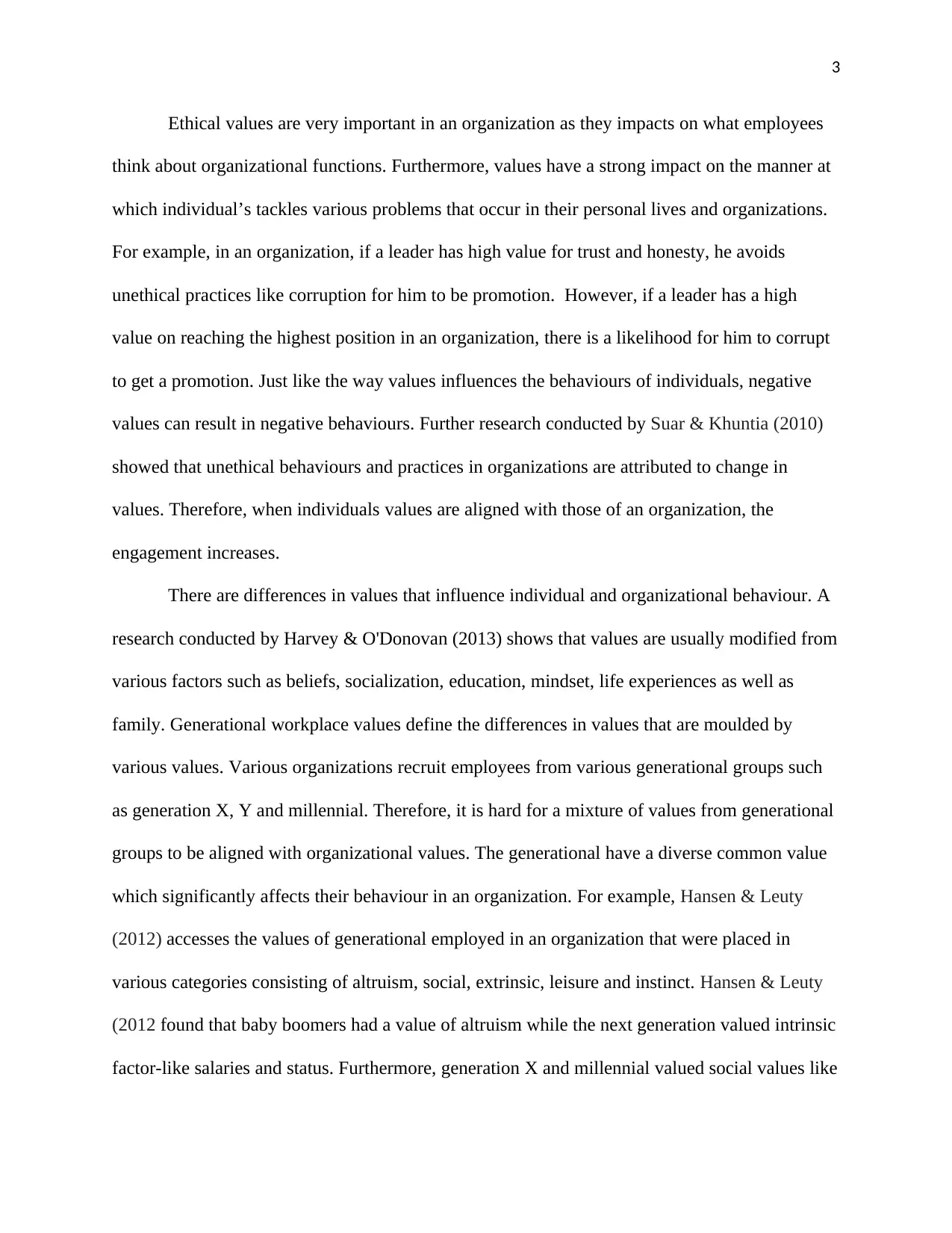
3
Ethical values are very important in an organization as they impacts on what employees
think about organizational functions. Furthermore, values have a strong impact on the manner at
which individual’s tackles various problems that occur in their personal lives and organizations.
For example, in an organization, if a leader has high value for trust and honesty, he avoids
unethical practices like corruption for him to be promotion. However, if a leader has a high
value on reaching the highest position in an organization, there is a likelihood for him to corrupt
to get a promotion. Just like the way values influences the behaviours of individuals, negative
values can result in negative behaviours. Further research conducted by Suar & Khuntia (2010)
showed that unethical behaviours and practices in organizations are attributed to change in
values. Therefore, when individuals values are aligned with those of an organization, the
engagement increases.
There are differences in values that influence individual and organizational behaviour. A
research conducted by Harvey & O'Donovan (2013) shows that values are usually modified from
various factors such as beliefs, socialization, education, mindset, life experiences as well as
family. Generational workplace values define the differences in values that are moulded by
various values. Various organizations recruit employees from various generational groups such
as generation X, Y and millennial. Therefore, it is hard for a mixture of values from generational
groups to be aligned with organizational values. The generational have a diverse common value
which significantly affects their behaviour in an organization. For example, Hansen & Leuty
(2012) accesses the values of generational employed in an organization that were placed in
various categories consisting of altruism, social, extrinsic, leisure and instinct. Hansen & Leuty
(2012 found that baby boomers had a value of altruism while the next generation valued intrinsic
factor-like salaries and status. Furthermore, generation X and millennial valued social values like
Ethical values are very important in an organization as they impacts on what employees
think about organizational functions. Furthermore, values have a strong impact on the manner at
which individual’s tackles various problems that occur in their personal lives and organizations.
For example, in an organization, if a leader has high value for trust and honesty, he avoids
unethical practices like corruption for him to be promotion. However, if a leader has a high
value on reaching the highest position in an organization, there is a likelihood for him to corrupt
to get a promotion. Just like the way values influences the behaviours of individuals, negative
values can result in negative behaviours. Further research conducted by Suar & Khuntia (2010)
showed that unethical behaviours and practices in organizations are attributed to change in
values. Therefore, when individuals values are aligned with those of an organization, the
engagement increases.
There are differences in values that influence individual and organizational behaviour. A
research conducted by Harvey & O'Donovan (2013) shows that values are usually modified from
various factors such as beliefs, socialization, education, mindset, life experiences as well as
family. Generational workplace values define the differences in values that are moulded by
various values. Various organizations recruit employees from various generational groups such
as generation X, Y and millennial. Therefore, it is hard for a mixture of values from generational
groups to be aligned with organizational values. The generational have a diverse common value
which significantly affects their behaviour in an organization. For example, Hansen & Leuty
(2012) accesses the values of generational employed in an organization that were placed in
various categories consisting of altruism, social, extrinsic, leisure and instinct. Hansen & Leuty
(2012 found that baby boomers had a value of altruism while the next generation valued intrinsic
factor-like salaries and status. Furthermore, generation X and millennial valued social values like
⊘ This is a preview!⊘
Do you want full access?
Subscribe today to unlock all pages.

Trusted by 1+ million students worldwide
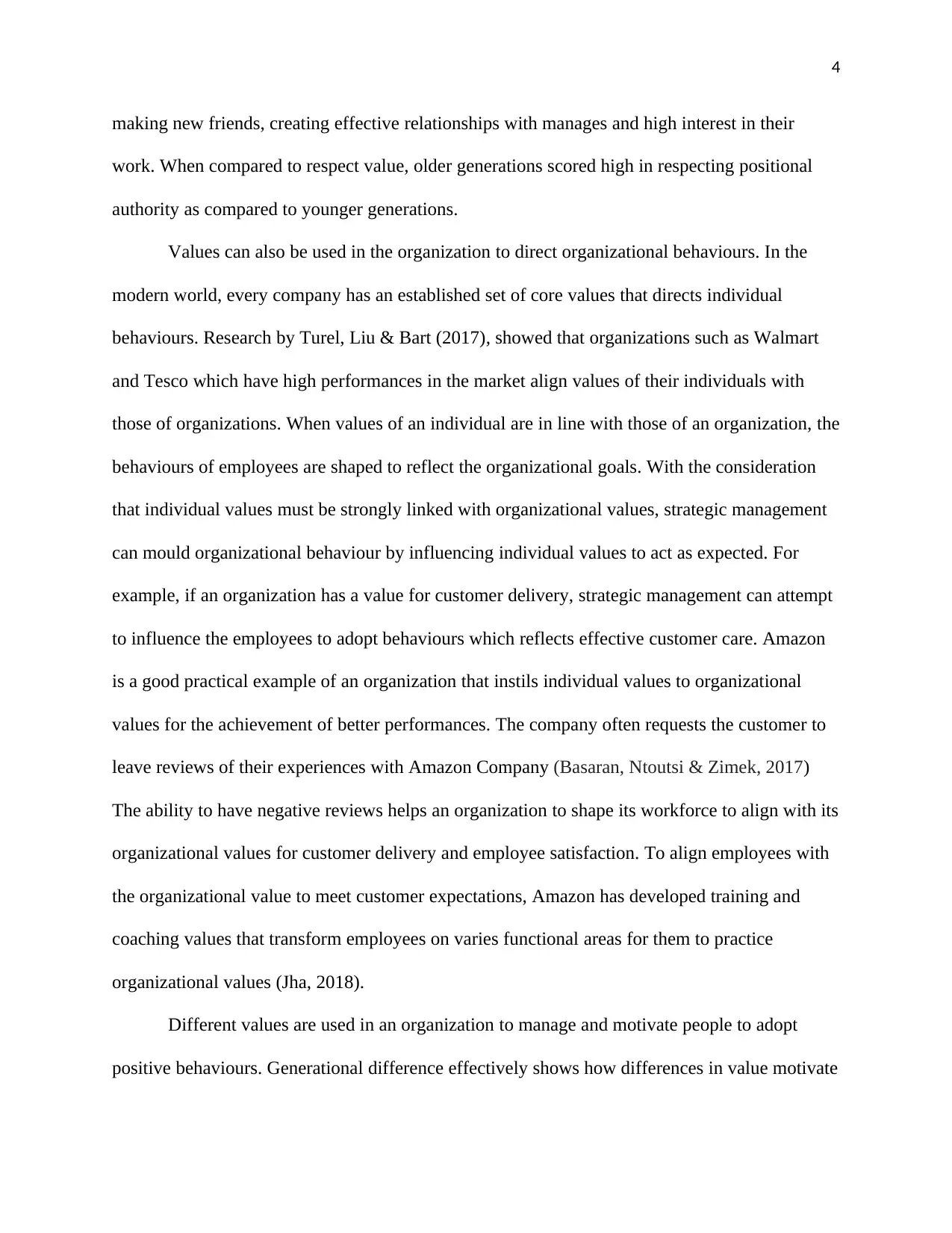
4
making new friends, creating effective relationships with manages and high interest in their
work. When compared to respect value, older generations scored high in respecting positional
authority as compared to younger generations.
Values can also be used in the organization to direct organizational behaviours. In the
modern world, every company has an established set of core values that directs individual
behaviours. Research by Turel, Liu & Bart (2017), showed that organizations such as Walmart
and Tesco which have high performances in the market align values of their individuals with
those of organizations. When values of an individual are in line with those of an organization, the
behaviours of employees are shaped to reflect the organizational goals. With the consideration
that individual values must be strongly linked with organizational values, strategic management
can mould organizational behaviour by influencing individual values to act as expected. For
example, if an organization has a value for customer delivery, strategic management can attempt
to influence the employees to adopt behaviours which reflects effective customer care. Amazon
is a good practical example of an organization that instils individual values to organizational
values for the achievement of better performances. The company often requests the customer to
leave reviews of their experiences with Amazon Company (Basaran, Ntoutsi & Zimek, 2017)
The ability to have negative reviews helps an organization to shape its workforce to align with its
organizational values for customer delivery and employee satisfaction. To align employees with
the organizational value to meet customer expectations, Amazon has developed training and
coaching values that transform employees on varies functional areas for them to practice
organizational values (Jha, 2018).
Different values are used in an organization to manage and motivate people to adopt
positive behaviours. Generational difference effectively shows how differences in value motivate
making new friends, creating effective relationships with manages and high interest in their
work. When compared to respect value, older generations scored high in respecting positional
authority as compared to younger generations.
Values can also be used in the organization to direct organizational behaviours. In the
modern world, every company has an established set of core values that directs individual
behaviours. Research by Turel, Liu & Bart (2017), showed that organizations such as Walmart
and Tesco which have high performances in the market align values of their individuals with
those of organizations. When values of an individual are in line with those of an organization, the
behaviours of employees are shaped to reflect the organizational goals. With the consideration
that individual values must be strongly linked with organizational values, strategic management
can mould organizational behaviour by influencing individual values to act as expected. For
example, if an organization has a value for customer delivery, strategic management can attempt
to influence the employees to adopt behaviours which reflects effective customer care. Amazon
is a good practical example of an organization that instils individual values to organizational
values for the achievement of better performances. The company often requests the customer to
leave reviews of their experiences with Amazon Company (Basaran, Ntoutsi & Zimek, 2017)
The ability to have negative reviews helps an organization to shape its workforce to align with its
organizational values for customer delivery and employee satisfaction. To align employees with
the organizational value to meet customer expectations, Amazon has developed training and
coaching values that transform employees on varies functional areas for them to practice
organizational values (Jha, 2018).
Different values are used in an organization to manage and motivate people to adopt
positive behaviours. Generational difference effectively shows how differences in value motivate
Paraphrase This Document
Need a fresh take? Get an instant paraphrase of this document with our AI Paraphraser
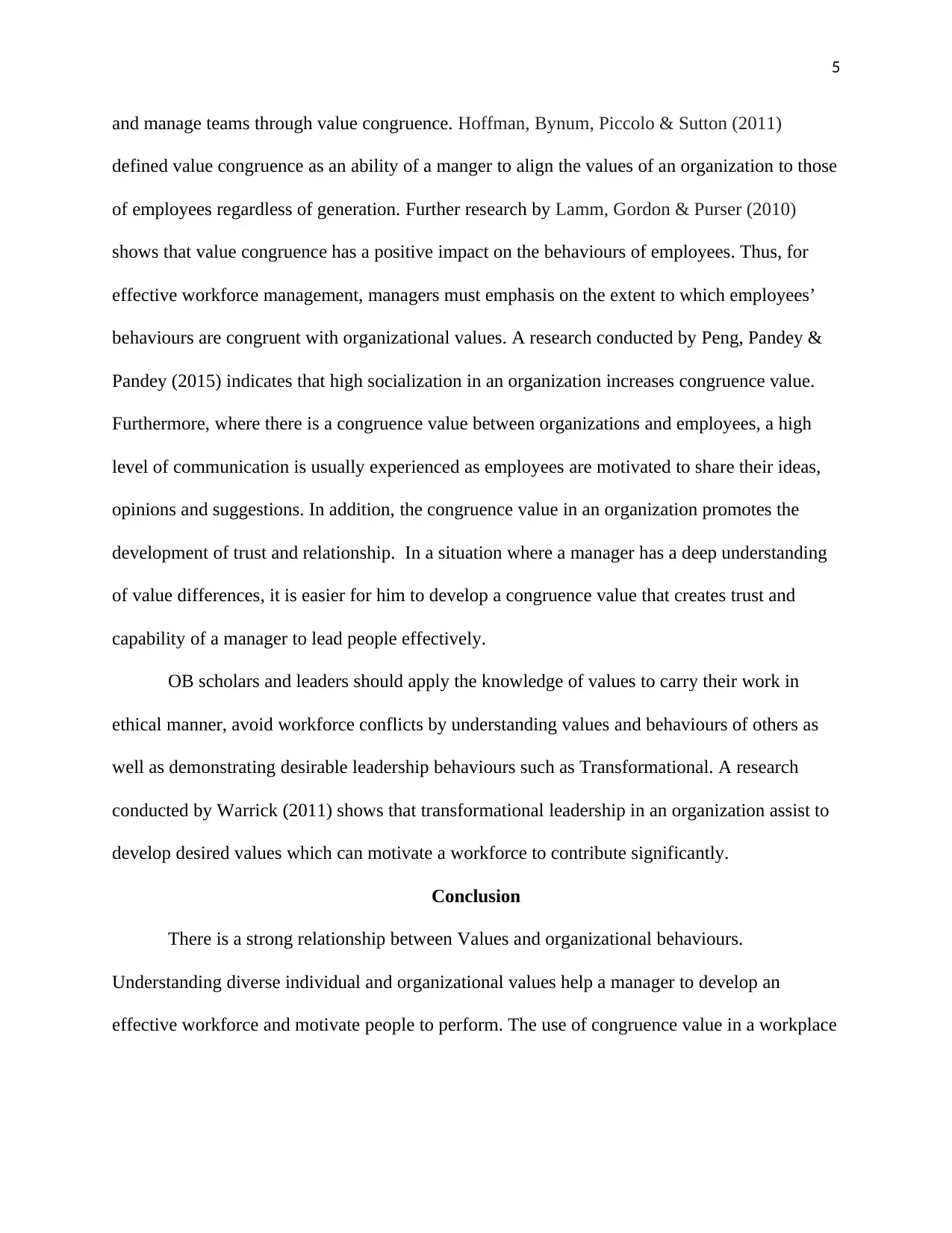
5
and manage teams through value congruence. Hoffman, Bynum, Piccolo & Sutton (2011)
defined value congruence as an ability of a manger to align the values of an organization to those
of employees regardless of generation. Further research by Lamm, Gordon & Purser (2010)
shows that value congruence has a positive impact on the behaviours of employees. Thus, for
effective workforce management, managers must emphasis on the extent to which employees’
behaviours are congruent with organizational values. A research conducted by Peng, Pandey &
Pandey (2015) indicates that high socialization in an organization increases congruence value.
Furthermore, where there is a congruence value between organizations and employees, a high
level of communication is usually experienced as employees are motivated to share their ideas,
opinions and suggestions. In addition, the congruence value in an organization promotes the
development of trust and relationship. In a situation where a manager has a deep understanding
of value differences, it is easier for him to develop a congruence value that creates trust and
capability of a manager to lead people effectively.
OB scholars and leaders should apply the knowledge of values to carry their work in
ethical manner, avoid workforce conflicts by understanding values and behaviours of others as
well as demonstrating desirable leadership behaviours such as Transformational. A research
conducted by Warrick (2011) shows that transformational leadership in an organization assist to
develop desired values which can motivate a workforce to contribute significantly.
Conclusion
There is a strong relationship between Values and organizational behaviours.
Understanding diverse individual and organizational values help a manager to develop an
effective workforce and motivate people to perform. The use of congruence value in a workplace
and manage teams through value congruence. Hoffman, Bynum, Piccolo & Sutton (2011)
defined value congruence as an ability of a manger to align the values of an organization to those
of employees regardless of generation. Further research by Lamm, Gordon & Purser (2010)
shows that value congruence has a positive impact on the behaviours of employees. Thus, for
effective workforce management, managers must emphasis on the extent to which employees’
behaviours are congruent with organizational values. A research conducted by Peng, Pandey &
Pandey (2015) indicates that high socialization in an organization increases congruence value.
Furthermore, where there is a congruence value between organizations and employees, a high
level of communication is usually experienced as employees are motivated to share their ideas,
opinions and suggestions. In addition, the congruence value in an organization promotes the
development of trust and relationship. In a situation where a manager has a deep understanding
of value differences, it is easier for him to develop a congruence value that creates trust and
capability of a manager to lead people effectively.
OB scholars and leaders should apply the knowledge of values to carry their work in
ethical manner, avoid workforce conflicts by understanding values and behaviours of others as
well as demonstrating desirable leadership behaviours such as Transformational. A research
conducted by Warrick (2011) shows that transformational leadership in an organization assist to
develop desired values which can motivate a workforce to contribute significantly.
Conclusion
There is a strong relationship between Values and organizational behaviours.
Understanding diverse individual and organizational values help a manager to develop an
effective workforce and motivate people to perform. The use of congruence value in a workplace
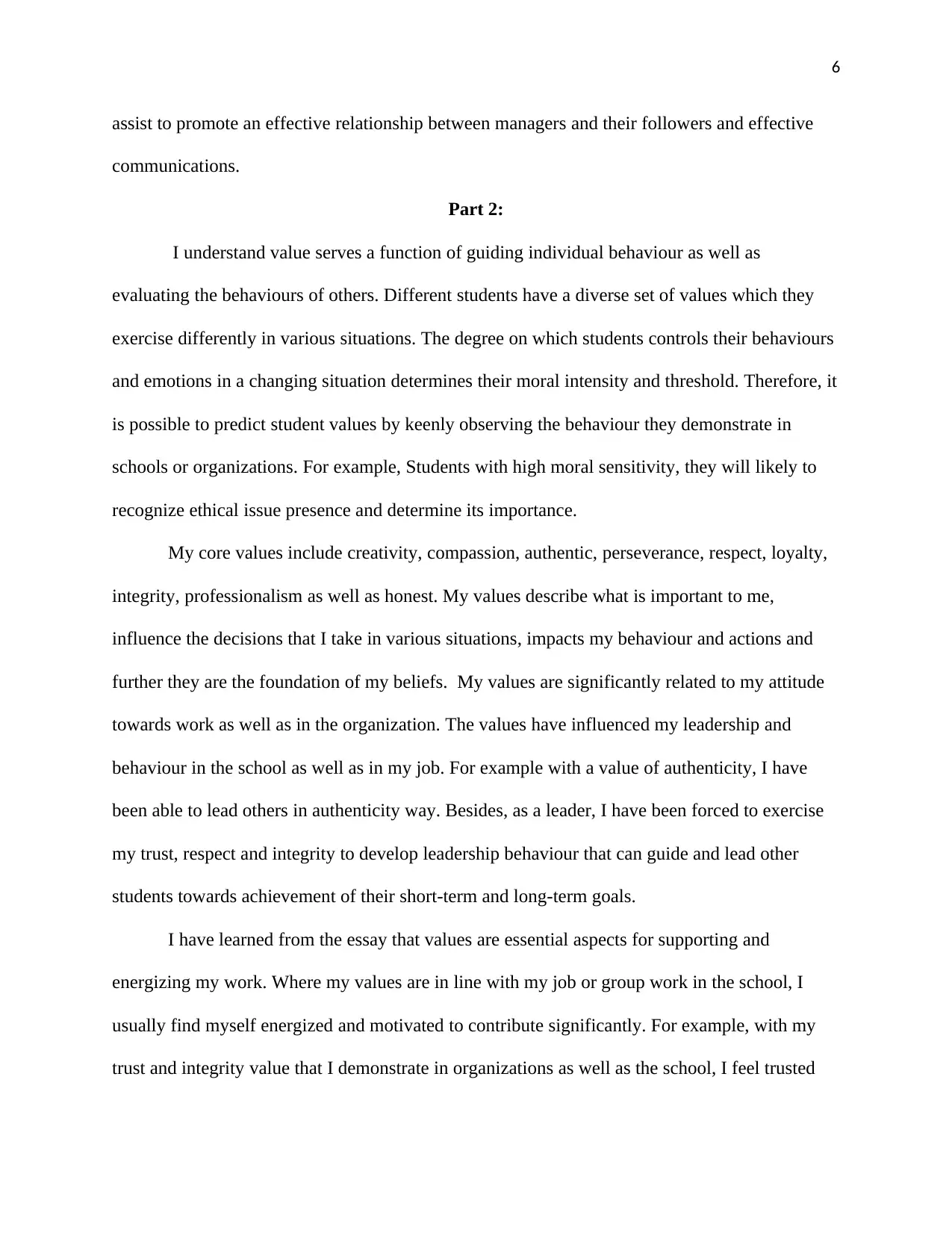
6
assist to promote an effective relationship between managers and their followers and effective
communications.
Part 2:
I understand value serves a function of guiding individual behaviour as well as
evaluating the behaviours of others. Different students have a diverse set of values which they
exercise differently in various situations. The degree on which students controls their behaviours
and emotions in a changing situation determines their moral intensity and threshold. Therefore, it
is possible to predict student values by keenly observing the behaviour they demonstrate in
schools or organizations. For example, Students with high moral sensitivity, they will likely to
recognize ethical issue presence and determine its importance.
My core values include creativity, compassion, authentic, perseverance, respect, loyalty,
integrity, professionalism as well as honest. My values describe what is important to me,
influence the decisions that I take in various situations, impacts my behaviour and actions and
further they are the foundation of my beliefs. My values are significantly related to my attitude
towards work as well as in the organization. The values have influenced my leadership and
behaviour in the school as well as in my job. For example with a value of authenticity, I have
been able to lead others in authenticity way. Besides, as a leader, I have been forced to exercise
my trust, respect and integrity to develop leadership behaviour that can guide and lead other
students towards achievement of their short-term and long-term goals.
I have learned from the essay that values are essential aspects for supporting and
energizing my work. Where my values are in line with my job or group work in the school, I
usually find myself energized and motivated to contribute significantly. For example, with my
trust and integrity value that I demonstrate in organizations as well as the school, I feel trusted
assist to promote an effective relationship between managers and their followers and effective
communications.
Part 2:
I understand value serves a function of guiding individual behaviour as well as
evaluating the behaviours of others. Different students have a diverse set of values which they
exercise differently in various situations. The degree on which students controls their behaviours
and emotions in a changing situation determines their moral intensity and threshold. Therefore, it
is possible to predict student values by keenly observing the behaviour they demonstrate in
schools or organizations. For example, Students with high moral sensitivity, they will likely to
recognize ethical issue presence and determine its importance.
My core values include creativity, compassion, authentic, perseverance, respect, loyalty,
integrity, professionalism as well as honest. My values describe what is important to me,
influence the decisions that I take in various situations, impacts my behaviour and actions and
further they are the foundation of my beliefs. My values are significantly related to my attitude
towards work as well as in the organization. The values have influenced my leadership and
behaviour in the school as well as in my job. For example with a value of authenticity, I have
been able to lead others in authenticity way. Besides, as a leader, I have been forced to exercise
my trust, respect and integrity to develop leadership behaviour that can guide and lead other
students towards achievement of their short-term and long-term goals.
I have learned from the essay that values are essential aspects for supporting and
energizing my work. Where my values are in line with my job or group work in the school, I
usually find myself energized and motivated to contribute significantly. For example, with my
trust and integrity value that I demonstrate in organizations as well as the school, I feel trusted
⊘ This is a preview!⊘
Do you want full access?
Subscribe today to unlock all pages.

Trusted by 1+ million students worldwide
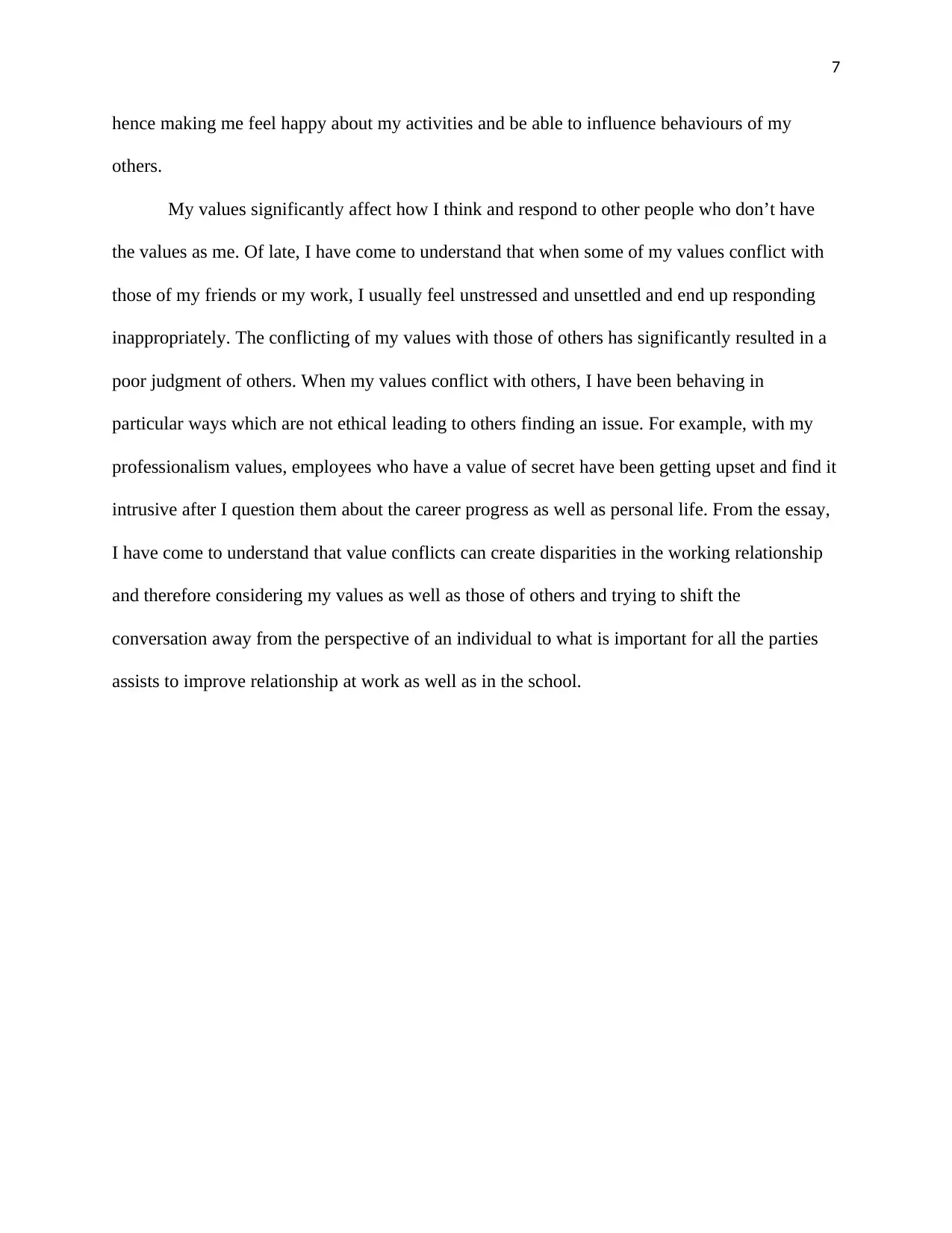
7
hence making me feel happy about my activities and be able to influence behaviours of my
others.
My values significantly affect how I think and respond to other people who don’t have
the values as me. Of late, I have come to understand that when some of my values conflict with
those of my friends or my work, I usually feel unstressed and unsettled and end up responding
inappropriately. The conflicting of my values with those of others has significantly resulted in a
poor judgment of others. When my values conflict with others, I have been behaving in
particular ways which are not ethical leading to others finding an issue. For example, with my
professionalism values, employees who have a value of secret have been getting upset and find it
intrusive after I question them about the career progress as well as personal life. From the essay,
I have come to understand that value conflicts can create disparities in the working relationship
and therefore considering my values as well as those of others and trying to shift the
conversation away from the perspective of an individual to what is important for all the parties
assists to improve relationship at work as well as in the school.
hence making me feel happy about my activities and be able to influence behaviours of my
others.
My values significantly affect how I think and respond to other people who don’t have
the values as me. Of late, I have come to understand that when some of my values conflict with
those of my friends or my work, I usually feel unstressed and unsettled and end up responding
inappropriately. The conflicting of my values with those of others has significantly resulted in a
poor judgment of others. When my values conflict with others, I have been behaving in
particular ways which are not ethical leading to others finding an issue. For example, with my
professionalism values, employees who have a value of secret have been getting upset and find it
intrusive after I question them about the career progress as well as personal life. From the essay,
I have come to understand that value conflicts can create disparities in the working relationship
and therefore considering my values as well as those of others and trying to shift the
conversation away from the perspective of an individual to what is important for all the parties
assists to improve relationship at work as well as in the school.
Paraphrase This Document
Need a fresh take? Get an instant paraphrase of this document with our AI Paraphraser
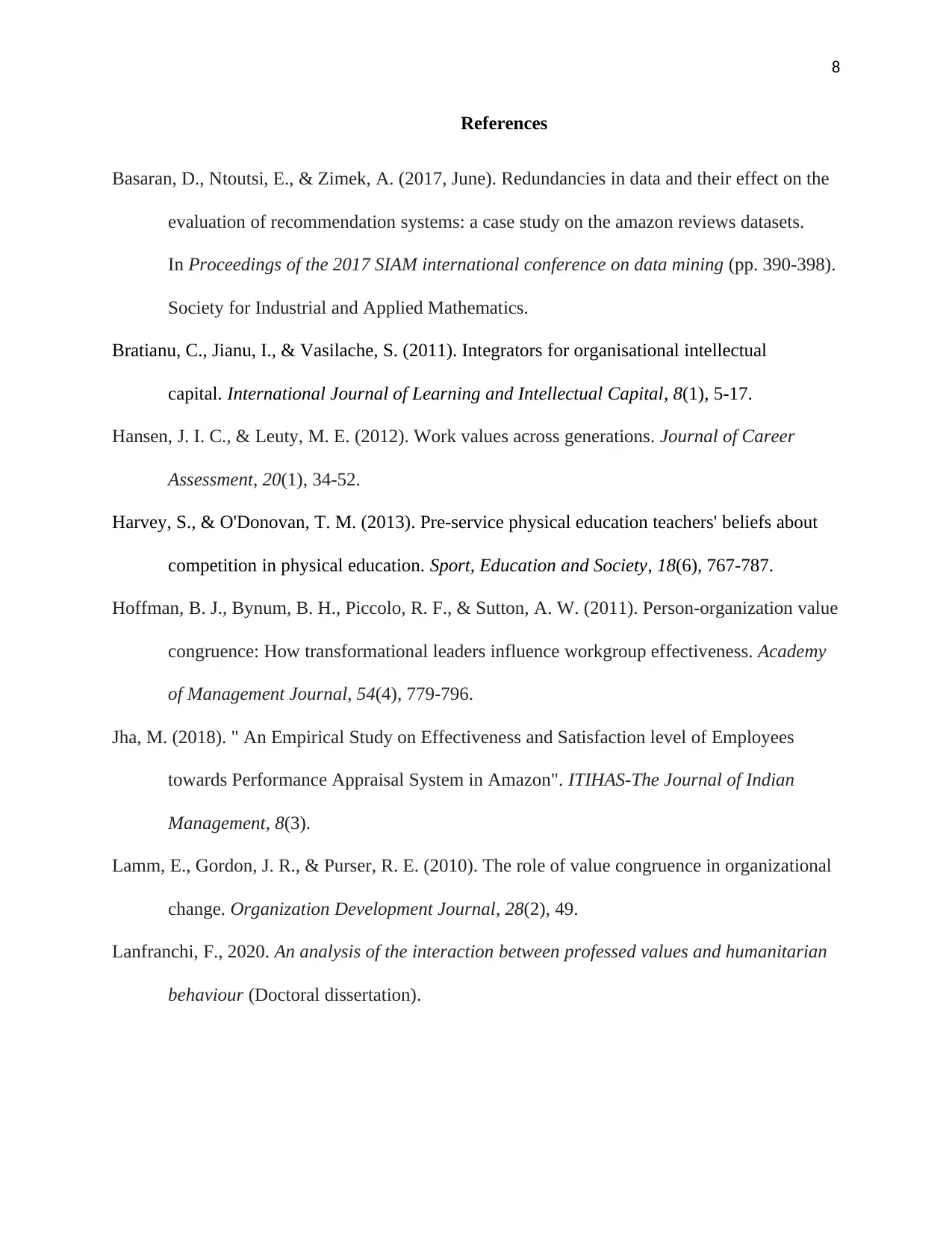
8
References
Basaran, D., Ntoutsi, E., & Zimek, A. (2017, June). Redundancies in data and their effect on the
evaluation of recommendation systems: a case study on the amazon reviews datasets.
In Proceedings of the 2017 SIAM international conference on data mining (pp. 390-398).
Society for Industrial and Applied Mathematics.
Bratianu, C., Jianu, I., & Vasilache, S. (2011). Integrators for organisational intellectual
capital. International Journal of Learning and Intellectual Capital, 8(1), 5-17.
Hansen, J. I. C., & Leuty, M. E. (2012). Work values across generations. Journal of Career
Assessment, 20(1), 34-52.
Harvey, S., & O'Donovan, T. M. (2013). Pre-service physical education teachers' beliefs about
competition in physical education. Sport, Education and Society, 18(6), 767-787.
Hoffman, B. J., Bynum, B. H., Piccolo, R. F., & Sutton, A. W. (2011). Person-organization value
congruence: How transformational leaders influence workgroup effectiveness. Academy
of Management Journal, 54(4), 779-796.
Jha, M. (2018). " An Empirical Study on Effectiveness and Satisfaction level of Employees
towards Performance Appraisal System in Amazon". ITIHAS-The Journal of Indian
Management, 8(3).
Lamm, E., Gordon, J. R., & Purser, R. E. (2010). The role of value congruence in organizational
change. Organization Development Journal, 28(2), 49.
Lanfranchi, F., 2020. An analysis of the interaction between professed values and humanitarian
behaviour (Doctoral dissertation).
References
Basaran, D., Ntoutsi, E., & Zimek, A. (2017, June). Redundancies in data and their effect on the
evaluation of recommendation systems: a case study on the amazon reviews datasets.
In Proceedings of the 2017 SIAM international conference on data mining (pp. 390-398).
Society for Industrial and Applied Mathematics.
Bratianu, C., Jianu, I., & Vasilache, S. (2011). Integrators for organisational intellectual
capital. International Journal of Learning and Intellectual Capital, 8(1), 5-17.
Hansen, J. I. C., & Leuty, M. E. (2012). Work values across generations. Journal of Career
Assessment, 20(1), 34-52.
Harvey, S., & O'Donovan, T. M. (2013). Pre-service physical education teachers' beliefs about
competition in physical education. Sport, Education and Society, 18(6), 767-787.
Hoffman, B. J., Bynum, B. H., Piccolo, R. F., & Sutton, A. W. (2011). Person-organization value
congruence: How transformational leaders influence workgroup effectiveness. Academy
of Management Journal, 54(4), 779-796.
Jha, M. (2018). " An Empirical Study on Effectiveness and Satisfaction level of Employees
towards Performance Appraisal System in Amazon". ITIHAS-The Journal of Indian
Management, 8(3).
Lamm, E., Gordon, J. R., & Purser, R. E. (2010). The role of value congruence in organizational
change. Organization Development Journal, 28(2), 49.
Lanfranchi, F., 2020. An analysis of the interaction between professed values and humanitarian
behaviour (Doctoral dissertation).
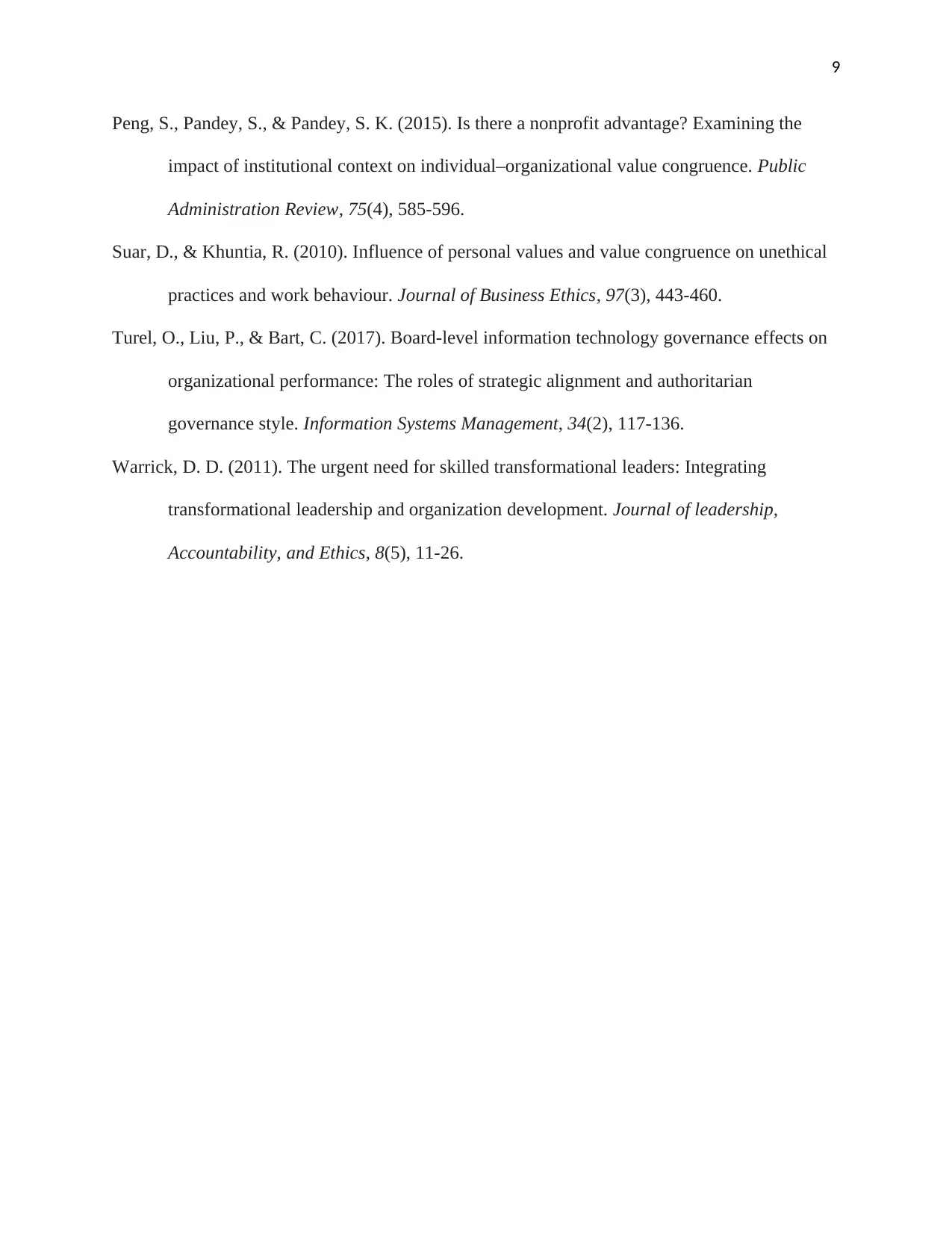
9
Peng, S., Pandey, S., & Pandey, S. K. (2015). Is there a nonprofit advantage? Examining the
impact of institutional context on individual–organizational value congruence. Public
Administration Review, 75(4), 585-596.
Suar, D., & Khuntia, R. (2010). Influence of personal values and value congruence on unethical
practices and work behaviour. Journal of Business Ethics, 97(3), 443-460.
Turel, O., Liu, P., & Bart, C. (2017). Board-level information technology governance effects on
organizational performance: The roles of strategic alignment and authoritarian
governance style. Information Systems Management, 34(2), 117-136.
Warrick, D. D. (2011). The urgent need for skilled transformational leaders: Integrating
transformational leadership and organization development. Journal of leadership,
Accountability, and Ethics, 8(5), 11-26.
Peng, S., Pandey, S., & Pandey, S. K. (2015). Is there a nonprofit advantage? Examining the
impact of institutional context on individual–organizational value congruence. Public
Administration Review, 75(4), 585-596.
Suar, D., & Khuntia, R. (2010). Influence of personal values and value congruence on unethical
practices and work behaviour. Journal of Business Ethics, 97(3), 443-460.
Turel, O., Liu, P., & Bart, C. (2017). Board-level information technology governance effects on
organizational performance: The roles of strategic alignment and authoritarian
governance style. Information Systems Management, 34(2), 117-136.
Warrick, D. D. (2011). The urgent need for skilled transformational leaders: Integrating
transformational leadership and organization development. Journal of leadership,
Accountability, and Ethics, 8(5), 11-26.
⊘ This is a preview!⊘
Do you want full access?
Subscribe today to unlock all pages.

Trusted by 1+ million students worldwide
1 out of 9
Related Documents
Your All-in-One AI-Powered Toolkit for Academic Success.
+13062052269
info@desklib.com
Available 24*7 on WhatsApp / Email
![[object Object]](/_next/static/media/star-bottom.7253800d.svg)
Unlock your academic potential
Copyright © 2020–2025 A2Z Services. All Rights Reserved. Developed and managed by ZUCOL.




